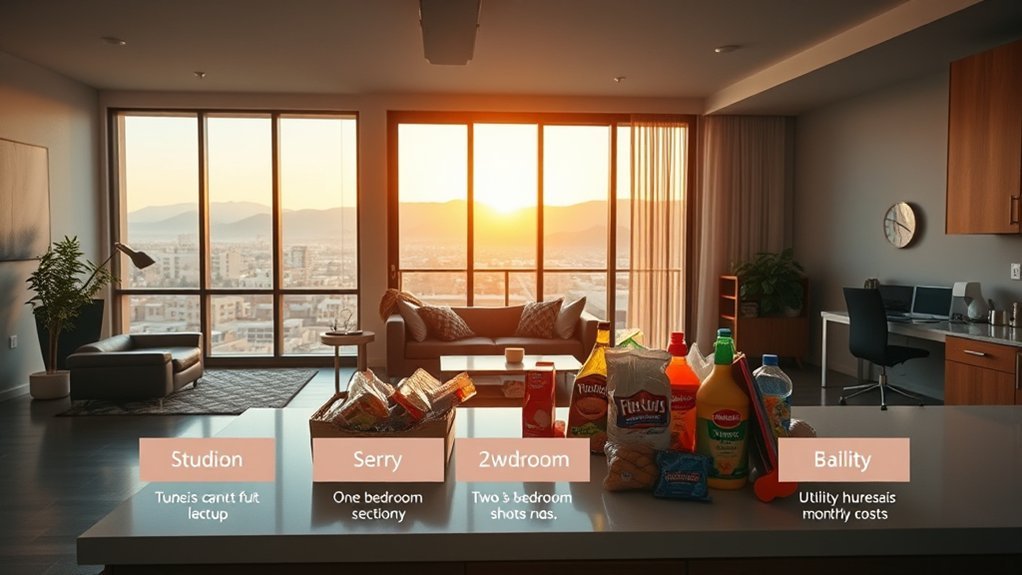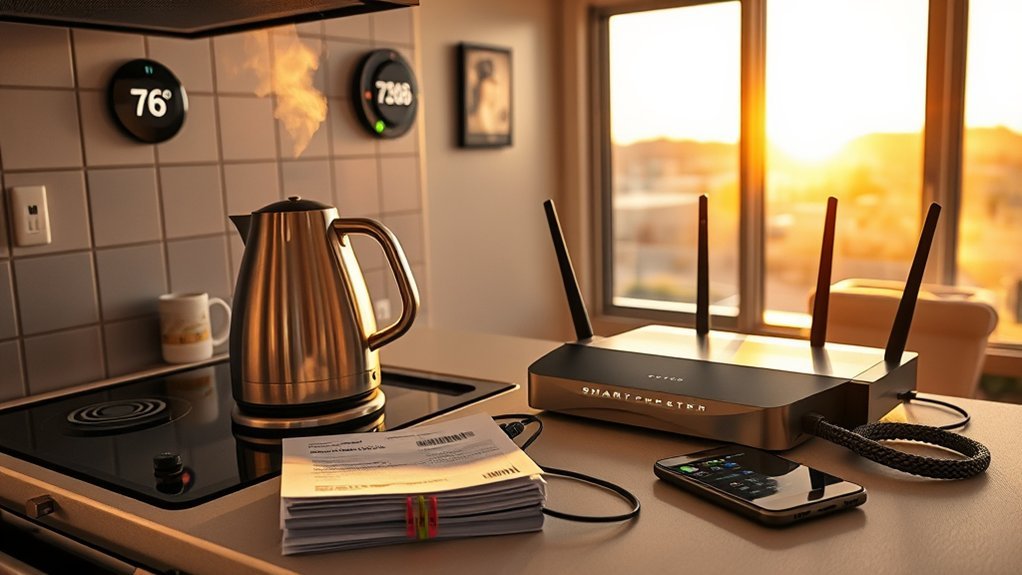You’ll need roughly $1,600–$2,200 monthly for rent depending on size and neighborhood, about $392 for utilities and internet, and ~$349 for groceries, so a basic single‑adult budget runs near $2,300–$3,000/month. Add transportation (driving costs can exceed $1,300/year), healthcare, and any childcare to reach family totals nearer $6,000–$8,000/month. Nevada’s no state income tax helps; keep reading for line‑item breakdowns and tips to trim bills.
Monthly Budget Breakdown for a Single Adult and Families

While North Las Vegas can offer lower rents than some nearby areas, you’ll need to budget carefully: a median one‑bedroom runs about $1,095–$1,527 monthly, implying a minimum annual income near $43,800 if you follow the 30% rent‑to‑income rule.
For a single adult, build a monthly budget that adds utilities and communications (~$393 total) to one-bedroom rent and plan groceries per month around $349.
Expect transportation costs near $1,322 monthly, which pushes your total cost of living notably above rent alone.
For families, compare median household income to combined housing costs and note childcare expenses: one child averages $1,143 monthly, two children exceed $2,232.
A dual-income household with two kids typically faces transportation costs around $1,757 monthly.
Additionally, understanding construction costs in your area can help you better plan for future housing expenses.
Use these line items—housing costs, utilities and communications, groceries per month, childcare expenses, transportation costs—to model different scenarios and see whether your income covers essential outlays before discretionary spending.
Average Rent and Housing Costs by Apartment Size

If you’re comparing apartment sizes in North Las Vegas, expect a wide range: median rent sits near $1,468 monthly, with one-bedrooms around $1,095 and two-bedrooms about $1,328, though some two-bedroom listings average as high as $1,828 and very affordable one-bedrooms can appear for as low as $442.
When you shop for North Las Vegas rent, use average rent figures to set expectations: one-bedroom rent varies from low-cost units under $500 to pricier markets over $2,000, while two-bedroom rent commonly ranges $1,328–$1,828.
Neighborhoods drive housing costs; upscale pockets post higher rents (one-bedrooms ~$2,039, two-bedrooms ~$2,279) versus affordable neighborhoods where one-bedrooms can sit near $1,273 and two-bedrooms $1,444.
Apply the 30% housing rule: you’d need about $43,800 annually for a one-bedroom and $53,120 for a two-bedroom without exceeding 30% of income.
If you’re weighing buy vs. rent, note median home price ranges in the broader market sit roughly $444,000–$508,261.
Utilities, Internet, and Communication Expenses

You’ll typically pay about $246.66 monthly for electricity, gas, and water in a ~915‑sqft unit, with total utilities plus communication averaging roughly $392.50.
Expect energy bills to be above the national average—often $226–$255 in hotter months—so factor higher electricity when comparing plans.
Review basic home internet options and phone/streaming choices carefully, since phone bills can run about $213.87 and communications commonly push combined costs into the $250–$400 range. Regular inspections are important to identify issues early, including those related to air conditioning performance.
Monthly Utility Breakdown
Because utilities and communications make up a predictable portion of your monthly housing costs in North Las Vegas, plan for about $392.50 per month on average for energy, water, sewage, internet, and mobile service for a 915‑sq‑ft apartment.
North Las Vegas utilities push monthly utilities slightly above national norms (utility index ~102.6). Expect energy bills—electricity costs—to run about $226.90–$255 in months with heavy AC use; water and sewage bring the energy/water/sewage subtotal to roughly $246.66.
Internet and mobile are included in the $392.50 figure, though standalone phone estimates can be higher.
When you set a utility budget, factor seasonal cooling costs and possible HOA fees, which may add $50–$400+ depending on your housing and services.
Internet Service Options
Wondering how much to budget for internet and phone in North Las Vegas? You should plan around the combined average monthly Internet and communication cost of about $392.50, which folds into Utilities in Las Vegas totals.
For a ~915 sq ft apartment utilities average $246.66 and dedicated Broadband plans typically run $40–80/month depending on speed.
Many residents find reliable cable/DSL or fiber for $50–70/month; unlimited mobile phone bills average roughly $213.87 but single-line unlimited options start near $40–60/month.
If you shop, a single-person monthly internet + phone budget of $80–140 is realistic.
Watch bundles and promotional rates: initial discounts last 12–24 months, with higher renewal prices and possible installation or equipment fees.
Phone and Streaming Costs
When you add up home internet and mobile service in North Las Vegas, expect to budget roughly $350–$400 per month for reliable coverage, though targeted shopping can bring a single-person bill down to $80–$140.
Your typical monthly phone bills are high if you stick with full-service carriers — averages near $214 when bundled — but standalone home internet plans run $40–$70 for 30–100 Mbps and fiber exceeds $100.
To cut costs, evaluate bundling services versus MVNO prepaid plans, which can drop phone costs to $30–$60. Don’t forget streaming subscriptions and seasonal data usage that spike bills in summer. Track internet speeds and costs, compare promotions, and prioritize the phone and internet mix that fits your communication utilities budget.
Transportation Costs: Driving, Public Transit, and Commuting

You’ll spend most of your transportation budget on a car—about $15,858/year for a single driver and roughly $21,088/year for a two-income household with kids, covering fuel, insurance, maintenance, and payments.
With an average commute near 26 minutes and gas around $3.71/gal, fuel and wear add up quickly. Public transit exists (single ride ~$2, 30-day pass ~$65) but is often infrequent or inconvenient, so weigh costs against schedule flexibility. Additionally, operational expenses related to transportation can significantly impact your overall budget if you have additional commuting needs for work or family activities.
Driving Costs Breakdown
Although public transit exists, most residents drive—about 95% commute by car—so expect transportation to be a major budget line: a single adult spends roughly $15,858 per year (about $1,322/month) on car payments, insurance, fuel, and maintenance, while a two-adult, two-child household averages about $21,088 annually (~$1,757/month).
When you budget driving, break down annual driving expenses: car payments and vehicle insurance are the largest fixed items, while gas prices (around $3.71–$3.92/gal) and maintenance and repairs vary with mileage and fuel economy.
Factor monthly commuting costs like parking fees, tolls, and phone/data for navigation.
Even with public transit fares at $2 per ride or $65 monthly, most find driving more practical, so plan for transportation costs that commonly push monthly totals well above $300.
Public Transit Options
Public transit is available in North Las Vegas, but it won’t replace a car for most people: about 95% of area residents commute by car, and many trips require driving for first- or last-mile access.
You can use public transit (RTC buses) for some trips — single rides are $2 and a 30-day pass is $65 — but infrequent service and limited transit routes make schedules inconvenient for many commutes.
Expect to rely on driving for work, errands, and school runs unless you live on a high-frequency corridor.
To reduce transportation costs, consider living near employment centers or strong transit routes, carpooling, or combining a 30-day pass with occasional rideshare to cover first/last-mile gaps.
Grocery, Dining Out, and Household Essentials

When budgeting for groceries and dining in North Las Vegas, expect to spend roughly $349 per month if you’re a single adult and about $1,023 for a four-person household, with annual food costs averaging $4,188 for one adult and about $12,275 for a two-adult household with two kids.
For Las Vegas groceries, your monthly groceries cost will reflect grocery prices North Las Vegas that run near regional averages — sometimes about 4% higher than national levels. Stock basic grocery staples prices like a loaf of bread at ~$4.10, a gallon of milk at ~$4.88, and a dozen eggs at ~$3.70 into your plan.
Dining out cost matters: the average meal price at an inexpensive restaurant is around $23, while a three-course midrange dinner for two is about $80. It’s also important to consider repair costs for school computers, which can significantly impact a school’s budget if not managed properly.
Track household essentials cost and monthly food spending closely; that lets you balance food budget single adult needs against family food expenses and make targeted adjustments to curb overspending.
Child Care, Education, and Family-Related Expenses

Food and childcare often compete for the same family dollars, so after accounting for groceries and dining out you should plan carefully for child-related costs in North Las Vegas.
Expect childcare costs to be one of your largest monthly outlays: average child care cost per month is about $1,143 for one child in the Las Vegas area and roughly $2,232 for two. MIT-style budgets put childcare near $1,981/month for a family of four.
Infant care and aftercare tend to be the priciest options; infant care commonly runs $850–$1,300/month per child, while preschool and aftercare add significant fees. Public K–12 is free locally, but private school tuition ranges from $6,000–$20,000/year if you choose private education.
When you build a monthly childcare budget, include extracurriculars, supplies, and other child-related expenses—these push a four-person household’s basic annual budget well above $100,000. Additionally, consulting with a board-certified surgeon can help plan for potential family-related expenses such as a mommy makeover. Plan conservatively and compare centers to control costs.
Healthcare, Insurance, and Personal Care Costs

Because healthcare costs can vary widely by household size and needs, you should budget roughly $200–$650 per month for premiums, copays, and prescriptions in North Las Vegas — about $235/month for a single adult and roughly $646/month for a family of four based on local averages.
You’ll see monthly healthcare costs include healthcare premiums plus routine out-of-pocket medical expenses like the average doctor visit cost of about $115, dental around $100, and optometry near $111.
Family healthcare expenses rise if you add children, especially given childcare healthcare impact—childcare runs roughly $13,711 per child annually, often prompting higher coverage.
Nevada’s no state income tax can help offset insurance spending, but you should still plan for unexpected bills and high-cost treatments that aren’t covered.
Compare plans for employer contributions, deductibles, and network providers, and keep a separate short-term buffer for prescriptions and sporadic out-of-pocket costs to avoid financial strain. It may also be beneficial to consult an immigration lawyer if you have questions about healthcare access for non-citizens.
Taxes, Wages, and How Much You Need to Live in North Las Vegas

Although Nevada’s lack of state income tax means you’ll keep more of each paycheck, you still face other costs — a local sales tax of about 8.375% and higher-than-average housing and utilities — that shape how far that income goes.
In North Las Vegas, median income in the metro sits around $70–78k, but average rent for a one-bedroom (~$1,095–$1,468) or two-bedroom (~$1,328–$1,828) pushes housing costs well above national norms. Using the 30% housing rule, you’d need roughly $43,800–$73,000 annually to comfortably cover rent alone.
Average hourly wages range roughly $19.76–$25.62; a full-time worker at the low end may struggle without roommates or supplemental income. MIT’s living wage estimates about $24.10/hour for basic needs, and family-budget estimates put a family of four near $100–105k yearly.
In addition, understanding traffic lawyer costs can be crucial for budgeting unexpected legal expenses, especially if you encounter traffic violations in the area.
Factor sales tax rate, utilities and electricity, and other essentials into your monthly budget to determine whether your earnings meet local cost of living realities.
Frequently Asked Questions
Is It Expensive to Live in North Las Vegas?
It’s moderately costly; you’ll face high commute costs and grocery prices, variable utility bills, significant childcare expenses, and pet ownership fees, but decent healthcare access, entertainment options, mixed neighborhood safety, limited public transportation, and hot seasonal weather.
What Salary Do You Need to Live Comfortably in Las Vegas?
You’ll need roughly $50k–$75k annually to live comfortably in Las Vegas; factor career progression, commute tradeoffs, side hustles, remote possibilities, lifestyle inflation, savings targets, childcare costs, healthcare premiums, tax considerations, and an entertainment budget.
What Is the Median Household Income in North Las Vegas?
The median household income in North Las Vegas is about $59,000; you’ll consider income trends, income growth, income disparity, income sources, income demographics, income comparison, income projections, income by neighborhood, and income stability when evaluating local finances.
How to Afford Living in Vegas?
Live affordably by trimming luxuries and boosting income: use budget hacks, roommate strategies, side hustles, transit savings, grocery tips, entertainment alternatives, utility budgeting, seasonal work, tax considerations, and healthcare planning to balance costs and income.
Conclusion
Living in North Las Vegas is like budgeting for a road trip: when I moved here, my first month felt like topping off a rental car — rent ($1,100 for a 1‑br on average) took the biggest tank, utilities and insurance were the odometer, groceries and commuting were gas stops. Keep a clear map of fixed vs. flexible costs, track real numbers, and you’ll steer monthly spending toward savings instead of running on empty.


